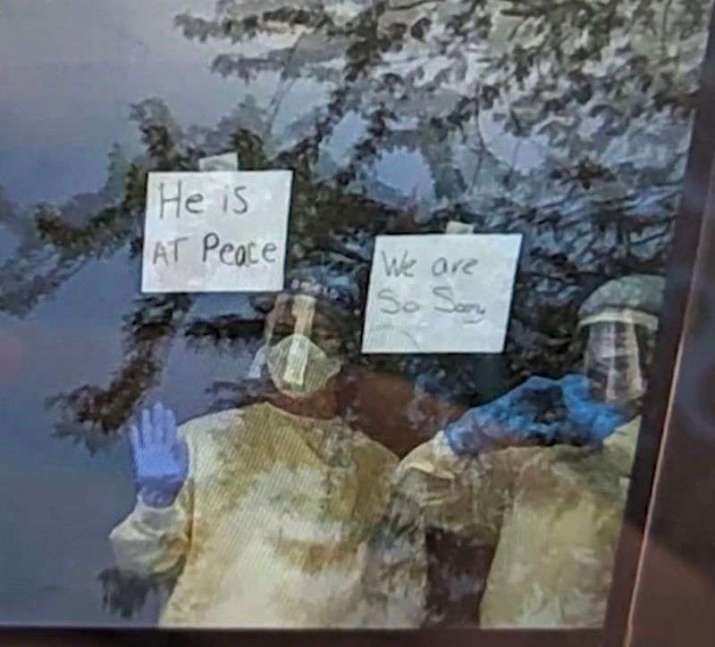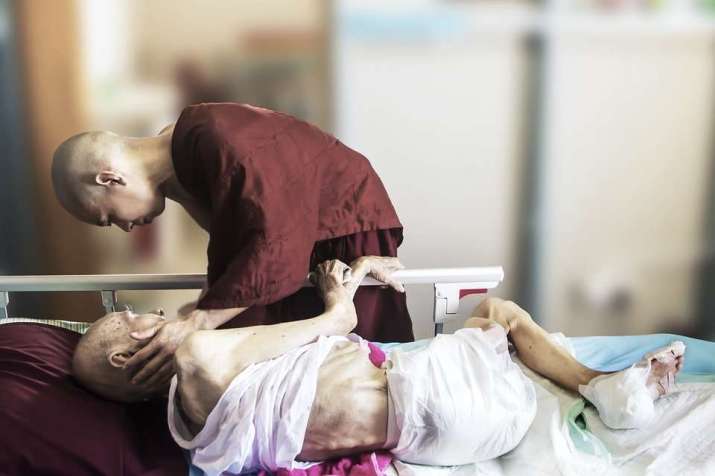FEATURES|COLUMNS|Death Dhamma
Death During this Time of Social Distancing
 From 9news.com.au
From 9news.com.auThere is an image that has been circulating on social media that cuts right to the heart of death during this pandemic. Two members of a medical team stand at a hospital window. Both of them are fully garbed in protective gear—they wear what looks like hazmat suits; their heads are concealed within hoods, and masks cover their mouths and noses. You can just barely make out their eyes. Each of them holds a sign up to the window. One reads: “He is at peace now.” The other: “We are so sorry.” We are left to wonder just how many friends and family members are outside reading the signs. We know that because of the concerns around spreading COVID-19, they could not have held their loved one’s hand as he died.
Due to social distancing restrictions, there are many stories of family members hospitalized and dying without their loved ones seeing or speaking to them again. Or family members saying goodbye using FaceTime, or hearing final breaths over the phone. And for many of us, our grief is intensified because we think that the people we love are dying alone. Many of us are afraid that we, too, will die alone.
Dying alone is not a new phenomenon. Some of us will die at home in our sleep, or in a hospital bed when nobody is in the room, or in some other way without others present. Why do we have such an aversion to solitary death? Perhaps we are afraid of the unknown, and we want to have others to help us face it. We project this fear on to others, so we do not want them to be alone, and, most dangerously, we assume that we will be given that final moment to say, “I love you,” or “I forgive you,” or “Thank you,” or “Please forgive me.” However, when it comes to death, it is best not to make assumptions. This is what we know:
Those who have come to be,
those who will be,
All will go,
leaving the body behind.
The skillful person,
realizing the loss of all,
should live the holy life ardently. (Ud 5.2)
To practice Buddhism is to accept impermanence. To fully embrace impermanence is to understand that everything that arises also ceases. Everything also means everyone. We are all going to die, and we are all going to lose people we love. That’s how it works. You would do well to spend time considering death, thinking that this could be your last day. That this could be the last day of someone you love. It is useful to work with the phrase, “I too shall pass;” “Mom and Dad too shall pass;” “________ (name of a friend or loved one) too shall pass.”
The purpose of this practice is not to dwell in a place of morbidity, but to appreciate the preciousness of the life that you have been given. To be born as a human being is a gift. In this lifetime, you can practice the Dhamma. When you die, you might lose this opportunity.
Reconcile where you can and where you cannot reconcile, make peace with it yourself. Much of this is about your need for a last-minute apology or goodbye or to tell someone that you love them. If they always know that you love them, you eliminate this regret.
Some do not understand
that we must die,
But those who do realize this
Settle their quarrels. (Dhp 6)
On a phone call a few years before his cancer diagnosis, Dad became very serious and told me that he always wanted me to know that he loved me and was proud of me. That there was nothing I had done that he was upset over. It was an important and challenging and liberating conversation. It was important and challenging because we were acknowledging that his death would come, liberating because it removed any hint of guilt or thought of parental disapproval. Not that I doubted my father’s love for me, and I was not ashamed of my life choices. But to be a Buddhist when my parents were staunch Catholics was initially not an easy choice. To divorce my first husband when my parents were staunch Catholics was not an easy decision. In that phone call, Dad made sure I did not have to wonder about his support. And that was quite a gift.
Become firm in your beliefs around what happens after death. Last year, a friend of mine lost his grandmother. This was not his first experience with death, but it was his most challenging. They had a strong bond and enjoyed spending time together. Her absence left a hole in his life and his heart. He also recognized that he did not have any explicit beliefs around what happens after death. His religious education had not included discussions on death and the afterlife. This confusion only made his grief more intense.
Now is the time to do so if you have not already considered death and what comes after death. When you develop clarity around your own beliefs about death, and what happens after death, you will be better prepared. Speak to your loved ones around how you want your death to be. Do not leave them with the pain of uncertainty. Ask them to tell you about their wishes. These are difficult conversations. Yet so much easier than not knowing if you are doing the right thing.

My Uncle Bill wanted to know that he was in the hospital and surrounded by people who loved him. Fortunately, this is how he died. My mother died at home, alone, on her couch while reading her prayer book. That is how she wanted it.
I have no regrets over my mother’s death because I knew she had the end she wanted and on her terms. She left careful instructions on how to handle everything after she was gone. I never had to doubt whether I was doing what she wanted. And when one or two of the plans she left in place went awry, I knew that she would have understood and that I had done my best.
Both of them were lucky. They were able to have the deaths that they wanted. There are no guarantees that we will have the same experience. Most of us do not know when or exactly how we will die. Whether or not we die during a time of social distancing, we might die alone. Drawing on our Buddhist practice is our best defense.
If your loved one dies and you cannot be with him or her, and you cannot have an official service, then create one of your own. Work with others to create a remembrance or celebration that captures their spirit and helps you with your grief. You might hold an online vigil and share his or her favorite images and music. You might form a temporary book club and read his or her favorite book. Or commit to meditating each day at a specific time in his or her honor. We live in rapidly changing times, seek to find solutions that bring you more peace and build kinship. And as you regain your strength, consider how you can help others who will have the same experience.
The Abhaya Sutta, AN 4.184, describes four people who are unafraid of death:
1. The person who has abandoned a craving for sensuality.
2. The person who has abandoned craving for the body.
3. The person who has done what is good and skillful, has done what is skillful, has given protection to those in fear, and has not done what is evil, savage, or cruel.
4. The person who has no doubt or confusion with regard to the True Dhamma.
The only guarantee is that we will die. And that dying alone is not the same thing as dying lonely. Learn how to be peaceful at the time of your death. Practice diligently. When you come to peace around death, you will know that it does not matter who is or is not next to you when you take your last breath.
This article is the first in a new column for Buddhistdoor Global titled Death Dhamma, by Theravada Buddhist author Margaret Meloni. Death Dhamma will offer a Buddhist perspective on death and dying, with the objective of helping us to accept death as an essential part of life.
Related features from Buddhistdoor Global
Do Not Resuscitate
Medical Torture and Why We Do It
Death and Dying in Japanese Buddhism
Rethinking Death with Natural Burial Practices
A Guided Tour of Hell: Illustrating Infernos in a Buddhist Graphic Novel














